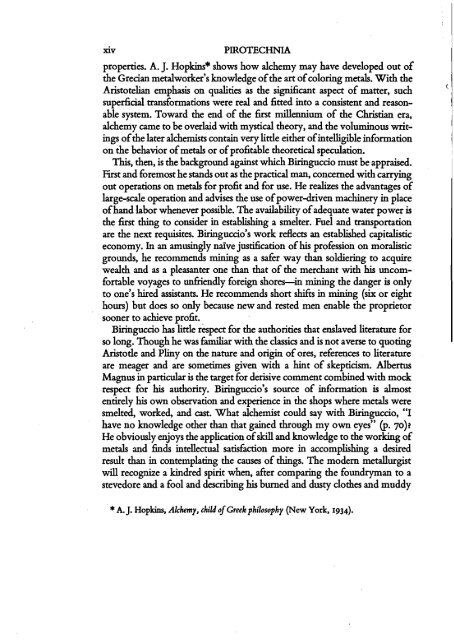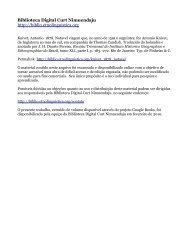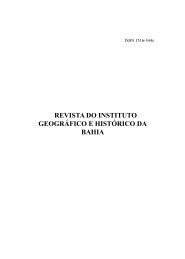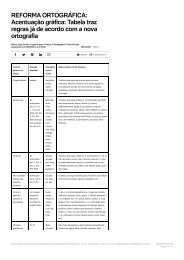Livro - Biringuccio - 09-1002-0
Artilharia os primórdios
Artilharia os primórdios
You also want an ePaper? Increase the reach of your titles
YUMPU automatically turns print PDFs into web optimized ePapers that Google loves.
dv<br />
PIROTECHNIA<br />
properties. A. J. Hopkins* shows how alchemy may have developed out of<br />
the Grecian metalworker's knowledge of the art of coloring metals. With the<br />
Aristotelian emphasis on qualities as the sipficant aspect of matter, such<br />
superficial transformations were real and fitted into a consistent and reasonable<br />
system. Toward the end of the h t millennium of the Christian era,<br />
alchemy came to be overlaid with mystical theory, and the voluminous writings<br />
of the later alchemists contain very little either of intelligible information<br />
on the behavior of metals or of profitable theoretical speculation.<br />
This,then, is the background against which <strong>Biringuccio</strong> must be appraised.<br />
First and foremost he stands out as the practical man, concerned with carrying<br />
out operations on metals for profit and for use. He realizes the advantages of<br />
large-scale operation and advises the use of power-driven machinery in place<br />
of hand labor whenever possible. The availability of adequate water power is<br />
the first thing to consider in establishing a smelter. Fuel and transportation<br />
are the next requisites. <strong>Biringuccio</strong>'s work reflects an established capitaistic<br />
economy. In an amusingly naive justification of his profession on moralistic<br />
grounds, he recommends mining as a safer way than soldiering to acquire<br />
wealth and as a pleasanter one than that of the merchant with his uncomfortable<br />
voyages to unfriendly foreign shores-in mining the danger is only<br />
to one's hired assistants. He recommends short shifts in mining (sixor eight<br />
hours) but does so only because new and rested men enable the proprietor<br />
sooner to achieve profit.<br />
<strong>Biringuccio</strong> has little respect for the authorities that enslaved literature for<br />
so long. Though he was familiar with the classics and is not averse to quoting<br />
Aristotle and Pliny on the nature and origin of ores, references to literature<br />
are meager and are sometimes given with a hint of skepticism. Albertus<br />
Magnus in particular is the target for derisive comment combined with mock<br />
respect for his authority. <strong>Biringuccio</strong>'s source of information is almost<br />
entirely his own observation and experience in the shops where met& were<br />
smelted, worked, and cast. What alchemist could say with <strong>Biringuccio</strong>, "I<br />
have no knowledge other than that gained through my own eyes" (p. 70)2<br />
He obviously enjoys the application of skill and knowledge to the working of<br />
metals and hds intellectual satisfaction more in accomplishing a desired<br />
result than in contemplating the causes of things. The modem metallurgist<br />
will recognize a kindred spirit when, after comparing the foundryman to a<br />
stevedore and a fool and describing his burned and dusty clothes and muddy<br />
c<br />
* A. J. Hopkins, Alchemy, child 4Greekphilosophy (New York, 1934).




![[Cortar & Editat] Artigo - BOXER, C.R - Portuguese Roteiros, 1500-1700_removed](https://documents.yumpu.com/000/065/314/939/2e145b8f9d020cb1478f6bb669de4b853369b67c/6e4a3773446b6e5073444a31584c575877512f4453673d3d/79416d746a45764d6c746a757456566f3043414958413d3d.jpg?AWSAccessKeyId=AKIAICNEWSPSEKTJ5M3Q&Expires=1714402800&Signature=mHWS1AwWNw7Qf5zYumHKSbFhqz0%3D)
![[Capa & Editar] Artigo - BARROS, Sigrid Porto de - A](https://documents.yumpu.com/000/063/816/786/af709ce29d1c721e5f74c145faeb760c1556c101/714f48715a616a2f324a556f537178394e6b4b4f54413d3d/45394b5a5354347734556b4a575634636c39565037413d3d.jpg?AWSAccessKeyId=AKIAICNEWSPSEKTJ5M3Q&Expires=1714402800&Signature=ajZ%2FcrGRS74yTFrs%2B8l20BUT0tA%3D)


